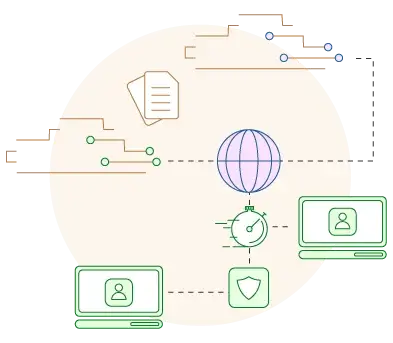Linux and Windows each bring along many inherent traits of their desktop counterparts in the context of web hosting. However, there are distinct advantages to the Linux Operating System (OS) that often gives it greater appeal. This is especially true when it comes to Virtual Private Servers (VPS).
Linux has long been seen as the superior choice when it comes to server-based operations. Since introduction as freeware in the early 1990s, it has since emerged in various flavors. The overall result is an OS that is cost effective, flexible, and highly efficient.
What is Linux Hosting?
Linux Hosting is the use of the Linux OS as the base for a web hosting server. The OS is the most important application to run on any device including servers. It is the link which allows all hardware on the server to communicate with and respond to application requests.
Even for very basic single-user devices, the OS is indispensable. For web servers, the role is even more important since it needs to manage all the hardware for multiple users. To give a better idea of the capabilities of an OS, some of its roles include (but are not limited to);
- Running applications
- Managing Input/Output operations
- Detecting and handling of errors
- Allocation of resources (CPU time, memory, etc)
Top Benefits of Linux
There have been many arguments about the superiority of various OS as the base for web servers. However, what is undeniable is the advantage that Linux brings to the table in this context. Let’s consider some of them here:
Cost
Earlier, I mentioned that Linux was introduced as freeware. Today, even close to 30 years after its release, Linux remains free to use, even for operating web servers. In fact, even though it has morphed into so many forms, there are very few paid-distribution versions of Linux in the market..
Because of this, Linux is a highly cost-effective choice when it comes to web hosting. With the cost of the OS itself out of the way, all that remains is how much you pay for server administration. While Linux server admins may not come cheap, neither do Windows server admins either.
On another note, Linux is also less demanding on server hardware. There have been some configurations of Linux known to run for over ten years without the need for significant hardware upgrades.
In contrast, Windows has always been resource hungry and jokes abound on how it typically grows in appetite as more resources become available. This may not be technically true, but it isn’t completely unfound either.
As a whole, to run Linux for web servers is less capital intensive both at the beginning as well as for long-term operations.
Flexibility
Because of the design philosophy with which it was constructed, Linux offers web hosting administrators unprecedented flexibility. Its highly adaptable nature means that it has been able to mold itself to almost any conceivable environment – if a distribution for that hasn’t already been created.
The building block concept in Linux is what makes it so formidable in this regard. Linux is made up of several distinct areas that work together as a whole. As an entirety, Linux is made up of;
- Kernel – This is the innermost sanctum of Linux and handles core instructions. It is the kernel that passes on instructions to critical areas such as processor, memory, and other devices.
- Bootloader – Responsible for only one task, the bootloader manages how the device that’s running Linux starts up. Even in the choice of bootloader, Linux offers users flexibility. Various bootloaders have different characteristics such as increased boot speed or the ability to handle multiple OS.
- Daemons – What Windows calls processes, Linux calls demons. They are essentially the same thing except that Linux allows users much greater control over what daemons are to be run at any given time, even upon system startup.
- Shell – Much akin to the DOS command line that Windows tries to pretend does not exist, the Shell allows Linux users to input direct commands to the system.
- Desktop environment – This is the ‘pretty’ portion of Linux and helps less technical users work in a more convenient way. Unlike Windows which integrates it as part of the OS, Linux desktop environments are treated like themes which can be replaced.
- Package managers and packages – These are the GUI-friendly options that lets users manage and install applications. Aside from applications, package managers also handle dependency – for example, does application A need application B in order to work?
All of these items work together to make up an entire Linux distribution. That’s part of where the flexibility in Linux truly comes from. This is part of what makes it ideal to be configured as a highly focused web hosting platform solution.
Security
Any server – be it Linux or Windows based, is only as secure as it is configured to be. Thankfully in this regard, Linux offers a massive number of options you can work with to harden it to the extreme. Again, this goes back to the way Linux is designed.
However, in order to handle this well you will need to have administrators who are knowledgeable enough to help you secure it. The great depth to which you can build Linux security comes with the caveat that users are able to handle it – which can be very time consuming given its level of detail.
For example, even something as simple as communications can rely on many security elements such as Secure Shell, Secure Copy, or Secure File Transfer Protocol. Elements like this govern everything there is about all communications such as how files are moved from A to B.
The ability that Linux gives its users to only enable needed services also helps reduce its potential vulnerabilities. Each service, application, or open port is a potential weak spot that attackers can use to infiltrate or otherwise attack a server. If you shut down Linux tightly enough, any attack will have a highly improbable chance of success.
All of this is paired with the regular defenses that most web servers have (including those on Windows) such as Malware scanning and detection.
Reliability
In the past, Linux was touted as being much more reliable than Windows thanks to its rock solid performance and secure design. However, that gap narrowed as Linux servers grew in popularity. Today, Linux is again seen as having the edge in reliability with lower incidences of penetration success.
For anyone who’s run Windows, one major frustration is sure to be the fact that the system needs frequent rebooting. Even if resources are being handled well, even a single application update can require a reboot of the entire device.
If you’re running in any type of VPS environment, it is likely that part of the consideration you put in was reliability. For those who are running eCommerce websites or similar, uptime should be a vital factor to your bottom line – and reputation. You simply do not want to need to reboot your system while customers are trying to pay for their purchases.
Choosing Linux for your VPS environment can help you prevent system instability leading to frequent reboots. This in turn improves the reputation of your site as well as helps you ultimately lower both operational and administrative costs.
Simplicity
On the surface, Linux today seems to work very much like Windows with an easy-to-use GUI and smooth setup process. However, the simplicity that gives Linux the real edge again goes back to the way it was designed.
With so many distributions of Linux available, there is literally something for everyone. This applies not just to the capabilities of the OS but even down to management. Some Linux distributions are much easier to handle and deploy than others. For those with lower server management skills, this makes Linux remain a viable platform for use.
Finding the Right Linux VPS Hosting
So far, we’ve covered Linux in the context of web hosting in a rather general way. However, even between web hosts, there can be a sea of difference from one to another. While it can be difficult to compare them all, ScalaHosting has much more of an edge when it comes to Linux VPS hosting than you can imagine.
Aside from the superior hardware and technical expertise that ScalaHosting has to offer, there are other key differences that makes it a much better choice. Chief among them is the availability of SPanel.
SPanel was developed by ScalaHosting to give users a viable option for the control of the web hosting environments. It was built to be highly compatible and allows the direct port in from other sources quickly and easily.
Along with that, ScalaHosting also offers two other distinct advantages:
- SShield
- SWordPress Manager
The former offers users real-time threat detection monitoring while the lattes allows easier management of WordPress deployments.
These advantages are unique to ScalaHosting and bring benefits that go far beyond what competitors can offer at similar price points.


Conclusion
To be honest, the real distinguishing choice between Linux and Windows as the OS of choice for web servers isn’t a difference in capabilities. Many users fear Linux in a similar way they fear the unknown. Yet Linux today is much more user-friendly than can be imagined while offering the same core benefits it always has.
In context of VPS hosting, Linux is a far better option especially on ScalaHosting, since users gain much more than simply the benefits of the OS itself.
What is a VPS – Everything you need to know!



